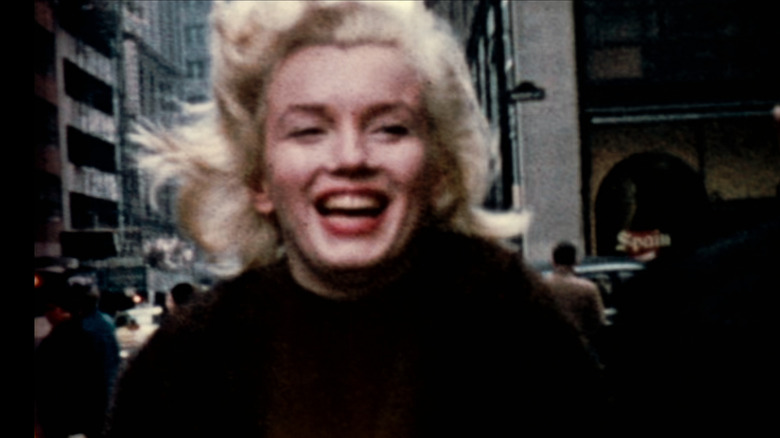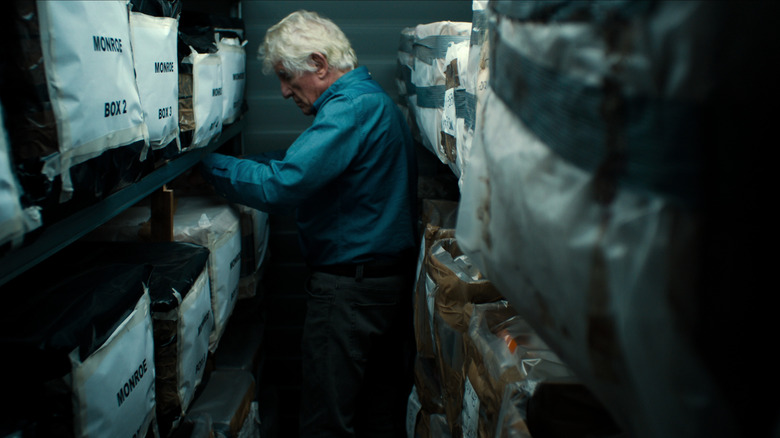The Mystery Of Marilyn Monroe: The Unheard Tapes Review: A Surface-Level Look At Bright Shining Star
In 1962, Marilyn Monroe was found dead at the age of 36. The cause of death: an overdose of barbiturates ruled a probable suicide — although there's a chance it was an accidental overdose. Her tragic, young death only further cemented her immortal status. She was the most famous woman in the world; a bombshell; a movie star; a living dream. And when stars that shine so bright burn out too soon, they work their way into our collective consciousness. We spend eternity remembering them, memorializing them, lionizing them. We become obsessed; not so much with their untimely demise, but with their image. Their persona. We want to chase after their lost light, and we want to understand what made them seemingly gods among us. They never fade away.
Of course, such untimely deaths also almost always lend themselves to conspiracy theories. And there have been plenty of theories surrounding Monroe's demise, especially due to her connection to the Kennedys. Could she have been murdered for being too close to such powerful men? Could the Kennedys have actually killed her and made it look like an accident? Monroe's affair with John F. Kennedy has become the stuff of legend, both of the tabloid variety and beyond. Seemingly everyone knows about it by osmosis. In the many years since, however, rumors have surfaced that Monroe had affairs with not just John Kennedy, but with his brother, Robert Kennedy, too. How much truth lurks within these claims is up for debate, but it's safe to say that at least something happened between the Kennedys and the movie star.
In his book "Goddess: The Secret Lives of Marilyn Monroe," author Anthony Summers delved into Monroe's life and affairs, and now Summers' research has become the basis for the Netflix documentary "The Mystery of Marilyn Monroe: The Unheard Tapes." That lurid, eye-catching title suggests something scandalous and shocking. More than that, it suggests that the documentary could be attempting to blow the lid off the true story surrounding her death. But that's not what "The Mystery of Marilyn Monroe."
In fact, it's not offering much of a mystery at all.
Only scratching the surface
It's likely that those streaming "The Mystery of Marilyn Monroe: The Unheard Tapes" will have at least some interest in Monroe. If so, viewers will probably have the basic details of her life and career — which makes "The Mystery of Marilyn Monroe" more than a bit frustrating, since it primarily plays the hits: her upbringing as Norma Jeane Mortenson; her break in Hollywood; her marriages to famous men like Joe DiMaggio and Arthur Miller; her addictions and neuroses.
In truth, as far as Monroe's life goes, the documentary offers less detail than you'd get from the starlet's Wikipedia page. In the end, the doc, helmed by Emma Cooper (who directed the engrossing docuseries "The Disappearance of Madeleine McCann") seems to posit that the real mystery was Monroe herself, not her untimely death. We can never really know her, this film appears to argue. She was too otherworldly to pin down.
Perhaps that's true. But that doesn't change the fact that "The Mystery of Marilyn Monroe" too often feels like it's merely scratching the surface and not trying to go much deeper. While I understand that the research of Anthony Summers is what helped shape this doc, Summers himself is far too present here, to the point where the documentary begins to feel more about him writing the book than it is about Monroe.
None of this is to say "The Mystery of Marilyn Monroe" is a wash. The editing together of archival footage of Monroe giving interviews, spliced with scenes from her movies, gives the entire thing the glitz and glam of old school Hollywood. Then there are the eponymous tapes themselves — tapes Summers recorded while researching his book. We hear the voices of legends like John Huston and Billy Wilder here, like ghosts reaching out to us from the past. But even this is slightly hampered by the film's strange decision to have actors portray these famous people in recreations. The audio recordings of the real voices are used, which means the actors here have to lip-sync, and it never once feels convincing. I appreciate that Cooper attempted something more cinematic rather than simply relying on voiceovers accompanying still images, but it just doesn't work.
Still, "The Mystery of Marilin Monroe" holds our interest, primarily because Monroe was so damn dazzling. We ultimately long for more. To Summers' credit, he comes right out and states he doesn't think Monroe was murdered, but there are plenty of other theories offered about her sad death. There are also interviews with the family members of Monroe's psychiatrist, detailing a somewhat unorthodox approach to the star's treatment. This could all border on ghoulish, but "The Mystery of Marilyn Monroe" thankfully avoids becoming too lurid and crass. But that doesn't change the fact that it leaves us wanting more. Perhaps this is just one mystery without a real solution.
/Film Rating: 6 out of 10

